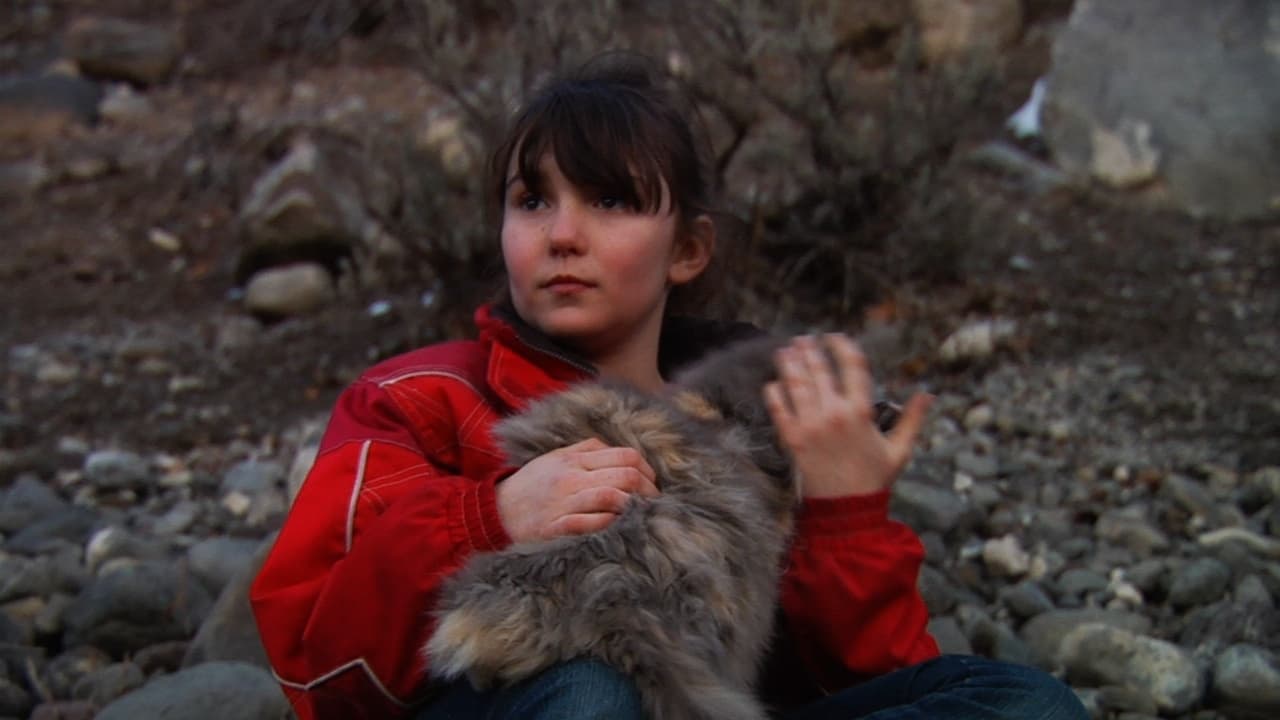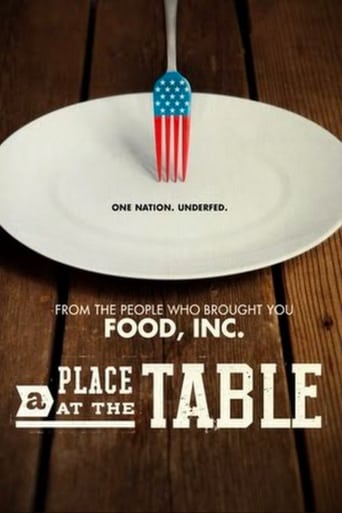

A PLACE AT THE TABLE (dir. Kristi Jacobson, Lori Silverbush) A brilliant documentary that confronts America's perennial inability to deal with the widespread problem of hunger in our nation. Ronald Reagan slashed federal programs that were beginning to solve the issue by the late 1970's, however he cynically felt that the matter would best be solved by relying on good old fashioned Christian charity. And it didn't work then, and it doesn't work now. Millions of Americans struggle daily with 'food insecurity' (you don't know where your next meal is coming from), and it seems that our leaders are convinced that the poor have it far too easy, and are just too dependent on the largess of the American tax payer. However, the film does expose the pertinent fact that America's richest food corporations were able to continue to enjoy 100% of their lavish federal government subsidy, yet the food stamp budget was severely cut to pay for a program to end childhood hunger. So much for our so called 'Christian' policies, and the film provides yet another reason for me to continue to be a proud secular humanist.
... View More"A Place at the Table" completely transformed my paradigm of America. When I hear the words "hunger" and "starvation," images of ravenous, malnourished, dying children in Africa instantly pop into my head. However, this poignant, simple, and impacting documentary showed me that "hunger" could be sitting right next to me in school. This 84-minute documentary details with moving austerity how and why even in America, the world's richest nation, children are going hungry.Featuring Academy Award winner Jeff Bridges, the founder of the End Hunger Network, "A Place at the Table" follows people, all from different towns and cultural backgrounds, who are food insecure. In other words, they have no idea when and how their next meal is going to come in. 50 million people in America are food insecure. This not only stunts physical development but mental development as well. Take Rosie, a fifth-grader growing up in rural Colorado. She tries to focus in school, but hunger pains cause her to zone out or to imagine her friends and teachers as fruits. Her dream is that one day, her kids can do what they want to do and what they need to do without going hungry. Another instance is Barbie, a single working mother with two kids. Her toddler son mumbles and has an attention-deficit symptom. This is because of the lack of food for Barbie and her family when he was born. The lasting effects of hunger in a child's first years impact a child much more deeply in the brain than the body. It's an emotional moment to see Barbie break down into tears in front of her kids, exhausted of the intense struggle to make ends meet.The documentary grippingly touches on so many different issues. It clears up myths and breaks stereotypes. A false paradigm that America blindly looks through is that hunger doesn't exist because children struggle with obesity. However, obesity, hunger, and being food insecure go hand-in-hand. Because of a low income, families on a very limited budget shop for the cheapest foods in store – chips, cookies, and ice cream. Produce is simply too expensive. Hunger exists not because there is not enough food. Hunger exists because it isn't a big enough issue on the political agenda. The documentary is packed with real statistics and visuals that are not just standard, cold numbers, but the toll of hunger is shown in the glimpses of families scrambling to break the cycle of poverty. This film calls out to audiences to end hunger in America by alerting politicians and the government. "It's just appalling," says actor Jeff Bridges. "You know if another country was doing this to our kids we would be at war. It's just insane and it doesn't have to be that way.""A Place at the Table" will truly open your eyes to the harsh realities of a food insecure nation. I am determined to push forward in this fight of ending hunger, and I believe our nation can rise out of the pit we've buried ourselves in. America's youth has a passion and an unbendable will to fight for what's right, and if pointed in the right direction, I believe that the American Dream of prosperity can come true. The only thing standing between now and the extinction of hunger is the hurdle of ignorance, clouding youths' and the government's minds. Share this documentary with friends and family – I recommend this for all ages. If we act with urgency and boldness, perhaps one day, everyone will have a place at the table. Reviewed by Cassandra Hsiao, KIDS FIRST! Film Critic, age 14. For more reviews, go to kidsfirst.org.
... View MoreMy wife and I downloaded this from iTunes today and were so impacted by the film. The film follows several people of different races and backgrounds, urban to the South to the mountains of Colorado. All are working (as the film goes on) but none make enough to buy enough food to be sure it will last all month. Many of them do not even qualify for food stamps/bridge cards. The fact that the poor and hungry have little lobbying impact in Washington compared to the gigantic agribusiness flood of money is clearly part of the reason we see this dilemma where the richest large nation fails miserably in keeping its working poor feed. Please see this film if you care about this issue. Many of your opinions may turn out to be misconceptions founded on stereotypes.As for Marc Newman's criticism, the idea that charity organizations like food kitchens and food banks sponsored by churches (yes, those clips of devoted pastors and churches were kept in and were very impressive) could solve this problem is ludicrous. We are talking about 50 million people and 13 million children. As my pastor (who is VERY conservative) says... the problem is overwhelming. There is no way volunteer and charitable organizations can meet the demand, and for Mr. Newman to suggest it could makes me wonder if he has ever worked at trying to get food to the poor. Many of us have done so and we know how huge this problem is... far beyond the resources of the faith community. As was noted in this documentary, the government once before almost totally eliminated hunger (in the late 70's) when both Democrats and Republicans (including Ronald Reagan) made it a priority. The government could do it again if it desired.
... View MoreIt's a national disgrace than nearly 50 million of our American neighbors live in homes that can't afford enough food. This compelling film explains why we have this problem, and, most importantly, what we can do to end it. Granted, I am biased because I fight hunger for a living, but I do think everyone in America should see this film.The film powerfully documents the real lives of real people struggling against hunger. Each of them defy common stereotypes of hungry people. Many Americans believe that we can end U.S. hunger one person at a time, one donated can of food at a time. They are well-meaning. But they are wrong, as this powerful film proves. When Ronald Reagan entered office in 1981, there were only a few hundred emergency feeding programs in America, most of which were traditional soup kitchens serving mostly the people who had been historically the most hungry—single men with substance abuse or mental illness problems. Yet, as a direct result of the economic policies and social service cuts set in motion by Reagan, the number of emergency feeding programs in America skyrocketed, and continued to do so even after he left office. There are now more than 40,000 such programs in America, and roughly two-thirds of them are food pantries, where parents and their children, the elderly, and working people obtain free groceries. Meanwhile, hunger has soared. The truth is that these agencies simply don't have anything close to the resources needed to meet the demand. The organization I manage, the New York City Coalition Against Hunger, found that, in 2011, close to sixty percent of the approximately 1,100 soup kitchens and food pantries in the city were forced to ration food because they lacked resources, either reducing portion size, limiting hours of operation, or turning away hungry families. These agencies are so under-funded that nearly 50 of them were forced to close in New York City in just the last few years.This vital film proves that the only way to truly end U.S. hunger is by advocating for fundamental change that include living wage jobs and a robust government safety net.
... View More